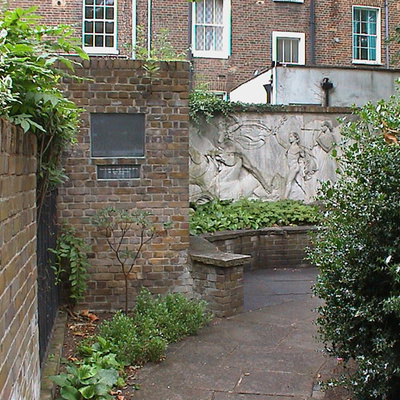From British History: The Hall of Commerce, existing some years ago in Threadneedle Street, was begun in 1830 by Mr. Edward Moxhay, a speculative biscuit-baker, on the site of the old French church. Mr. Moxhay had been a shoemaker, but he suddenly started as a rival to the celebrated Leman, in Gracechurch Street. He was an amateur architect of talent, and it was said at the time, probably unjustly, that the building originated in Moxhay's vexation at the Gresham committee rejecting his design for a new Royal Exchange. He opened his great commercial news-room two years before the Exchange was finished, and while merchants were fretting at the delay, intending to make the hall a mercantile centre, to the annihilation of Lloyd's, the Baltic, Garraway's, the Jerusalem, and the North and South American Coffee-houses. £70,000 were laid out. There was a grand bas-relief on the front by Mr. Watson, a young sculptor of promise, and there was an inaugurating banquet. The annual subscription of £5 5s. soon dwindled to £1 10s. 6d. There was a reading-room, and a room where commission agents could exhibit their samples. Wool sales were held there, and there was an auction for railway shares. There were also rooms for meetings of creditors and private arbitrations, and rooms for the deposit of deeds.
This section lists the memorials where the subject on this page is commemorated:
Moxhay's Hall of Commerce in Threadneedle Street
Commemorated ati
Battishill Gardens
This stone frieze (13 metres long, 2 metres high) was originally unveiled on ...
Other Subjects
Carter and Company / Poole Pottery
Ceramic tile manufacturers. Founded by Jesse Carter, a builders’ merchant and ironmonger from Surrey. It was later renamed as the Poole Pottery. The Carter company produced much of the ceramic til...
Worshipful Company of Skinners
Originally an association of fur traders, it is now an educational and charitable institution. It is one of the Livery Companies of the City of London.
Sir Horatio Grece Regnart
Born Jersey. Aged 15 joined John Maples, Furniture dealer, and progressed to being vice-president of of the store in Tottenham Court Road. 1870 married. Alderman of St Pancras Borough Council. Live...
Person, Benefactor, Commerce, Politics & Administration, Channel Islands
First pub outside Ireland to have bottled Guinness
The Tipperary pub, Fleet Street, was the first pub outside Ireland to have bottled Guinness and later draft.
Angel Inn, near Smithfield Angel Inn
We can't identify this pub.






Comments are provided by Facebook, please ensure you are signed in here to see them